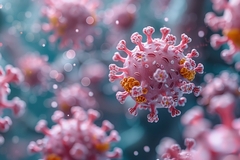
- Industry news
Industry news
- Category news
- Reports
- Key trends
- Multimedia
Multimedia
- Journal
- Events
- Suppliers
Suppliers
- Home
- Industry news
Industry news
- Category news
- Reports
- Key trends
- Multimedia
Multimedia
- Events
- Suppliers
Suppliers
NAD+ and long COVID: Study finds Niagen Bioscience’s healthy aging ingredient could ease symptoms
Key takeaways
- A clinical trial found that daily supplementation with Niagen NR (a form of nicotinamide riboside) significantly increased NAD+ levels in participants with long COVID.
- The supplementation was associated with within-group improvements in common long COVID symptoms, including fatigue, sleep quality, and depressive symptoms.
- The researchers conclude that coronaviruses disturbing NAD+ levels is an underlying disruption of multiple organ systems and cellular health.

A new “first-of-its-kind” clinical trial supports that daily supplementation with Niagen Bioscience’s patented nicotinamide riboside ingredient, Niagen NR, for ten weeks boosts positive recovery outcomes among individuals with long COVID. The condition is typically marked by fatigue, cognitive dysfunction, and disturbed sleep.
Specifically, the ingredient “significantly increased” levels of NAD+, a vital coenzyme found in every cell of the human body known to support cellular health by aiding in DNA repair and improving mitochondrial function.
“These findings demonstrate that ten weeks of Niagen NR supplementation increased NAD+ levels and improved long COVID symptoms of fatigue, sleep quality, and depression, compared to symptoms before treatment,” says Niagen Bioscience’s CEO, Rob Fried.

“As part of our mission to advance the science of cellular health, we are pleased to see Niagen NR used in research exploring the lasting impact of COVID-19 and look forward to future studies that further our understanding of NAD+ augmentation in recovery and resilience.”
According to statistics from the US Centers for Disease Control and Prevention, 5.3% of adults in the US reported that they experienced long COVID between August and September 2024.
Tackling a multi-system disorder
As a multi-system disorder, long COVID symptoms persist months or years after infection, including common fatigue, breathlessness, cognitive impairment or “brain fog” (disrupted attention, memory, sleep), muscle aches, depression, gut disorders, and anxiety.
“Long COVID presents with a wide range of symptoms because coronaviruses disturb NAD+ and thereby disturb multiple organ systems,” stresses study co-author Charles Brenner, Ph.D., chief scientific advisor to Niagen Bioscience.
Specifically, bodily disturbances underlying multi-organ disruption include immune system dysregulation, mitochondrial dysfunction, oxidative stress, and disrupted cellular energy metabolism.
The randomized, double-blind, placebo-controlled study took place over 24 weeks and included 58 participants. The researchers analyzed effects of elevating NAD+ with Niagen NR supplementation on cognitive and symptomatic recovery from long COVID.
“Our goal with this study was to understand whether increasing NAD+ levels with Niagen NR could improve cognitive performance primarily, but also other common symptoms in individuals with long COVID,” explains Dr. Edmarie Guzmán-Vélez, study lead and assistant professor in the Department of Neurology at the Robert Wood Johnson Medical School, and the Center for Health Aging Research at the Institute for Health, Rutgers University, US.
“We saw encouraging within-group improvements in fatigue, sleep, and mood, although we did not observe statistically significant differences between people taking Niagen NR and those taking a placebo.”
Study parameters
The hospitalized participants, with an average age of 45 years, all had persistent symptoms following COVID-19 infection. They were randomized to receive either Niagen NR (2,000 mg/day) for 20 weeks or a placebo for ten weeks followed by ten weeks of Niagen NR.
The researchers primarily studied changes in cognitive performance using validated scales and tests. The next benchmarks were fatigue, mood, and sleep quality.
Following Niagen NR supplementation, NAD+ levels increased up to 3.1-fold after five to ten weeks.
Significant within-group improvements occurred in terms of fatigue severity, sleep quality, and depressive symptoms following ten weeks of Niagen NR supplementation.
Niagen NR was “well-tolerated” and there were no significant differences in adverse events between the Niagen NR and placebo groups, according to the study authors.
“What is encouraging is that despite variability among patients, we observed consistent signals of improvement with elevation of NAD+ levels. This suggests that restoring the NAD+ system can restore multiple biological pathways implicated in long COVID — including mitochondrial function, inflammation, and cellular repair,” says Brenner.
“It is a compelling indication that NAD+ biology can be effectively targeted in conditions of metabolic stress such as long COVID.”
The McCance Center for Brain Health at Mass General Hospital co-funded the study alongside Niagen Bioscience. Niagen Bioscience states it had no role in the study design, conduct, outcomes, analyses, or publication.
Guzmán-Vélez says these findings suggest that restoring NAD+ “remains a promising avenue” for recovery, but adds that research is needed to confirm and expand on these findings.













